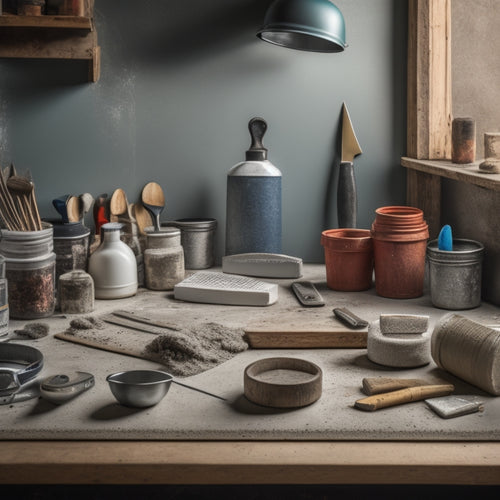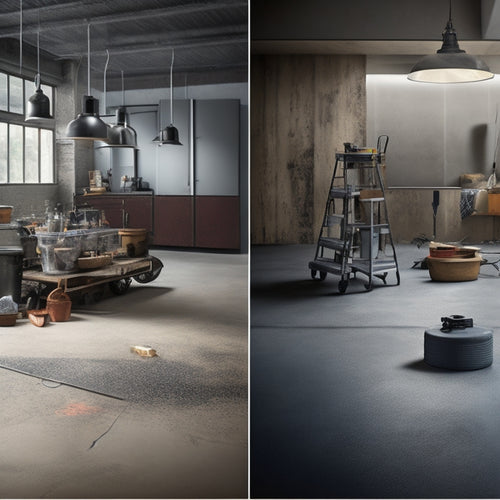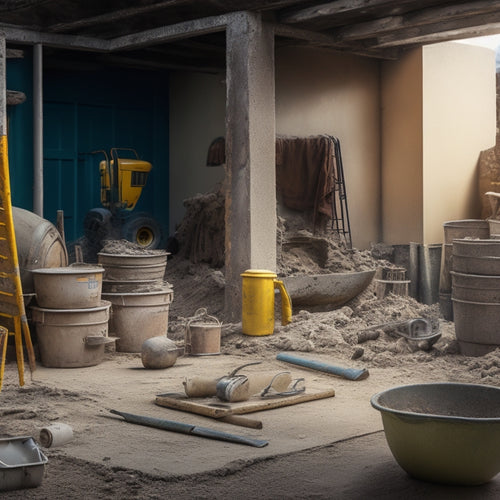
What Concrete Tools Do You Really Need
Share
You'll need a solid arsenal of specialized tools to achieve professional-grade concrete results, and understanding which ones are essential to your project's success is vital. You'll require must-haves like a drum mixer, finishing trowel, and concrete saw, as well as safety gear like dust masks and safety goggles. Additionally, you'll need measuring devices like a tape measure and laser level, and testing tools like a concrete test hammer and pH meter. With these tools, you'll be well-equipped to tackle various concrete projects - but it's just the starting point for crafting exceptional concrete that meets your vision.
Key Takeaways
• Essential mixer types include drum mixers, pan mixers, and continuous mixers, each requiring specific techniques and accessories.
• A variety of trowels, floats, and edgers are necessary for achieving high-quality finishes and smoothing out surface imperfections.
• Cutting and breaking concrete requires specialized tools like concrete saws, demolition hammers, and chisels, chosen based on project needs.
• Tamping and compacting tools, such as hand tampers, plate compactors, and jumping jack compactors, are crucial for preventing cracks and ensuring integrity.
• Measuring and testing devices, including tape measures, laser levels, and concrete test hammers, are vital for achieving accurate results and detecting defects.
Must-Have Tools for Mixing
When preparing to mix concrete, you'll need a set of essential tools to guarantee a smooth, consistent, and successful process.
The right mixer type is vital, and you'll need to choose between a drum mixer, pan mixer, or continuous mixer, depending on the scale and type of your project. Each mixer type requires specific mixing techniques to achieve the best results. For instance, a drum mixer requires a thorough mixing technique to verify all ingredients are well combined. On the other hand, a pan mixer demands a more gentle approach to prevent over-mixing.
In addition to the mixer, you'll need a range of accessories, including a mixing paddle, tamping tool, and bucket or wheelbarrow for transporting the mixed concrete. A mixing stick or trowel is also necessary for scraping the sides and bottom of the mixer.
Don't forget a dust mask and safety goggles to protect yourself from the dust and debris generated during the mixing process.
With the right tools and techniques, you'll be able to achieve a high-quality mix that meets your project's specifications.
Essential Finishing and Smoothing
Now that you've mixed your concrete to the perfect consistency, you'll need to guarantee it's properly finished and smoothed to achieve a professional-looking result. This is where your finishing and smoothing tools come into play.
You'll need a range of trowels, including a finishing trowel, a pool trowel, and an edger, to achieve the desired surface textures. Mastering trowel techniques is vital to producing a high-quality finish. You'll need to develop a feel for the right amount of pressure and movement to achieve the desired texture.
Invest in a high-quality finishing float to remove any imperfections and smooth out the surface. A steel finishing trowel is also essential for creating a smooth, even finish. Don't forget an edger for creating clean, sharp edges.
With the right tools and techniques, you'll be able to achieve a range of surface textures, from smooth and glossy to textured and decorative. By investing in these essential finishing and smoothing tools, you'll be able to take your concrete work to the next level and produce professional-looking results that will impress.
Cutting and Breaking Essentials
You'll need a set of cutting and breaking tools to efficiently and safely manipulate your concrete, including a concrete saw, demolition hammer, and chisels, to name a few.
These tools will allow you to cut through concrete slabs, break up old pavement, and demo existing structures with ease. Concrete saws, in particular, are essential for making precise cuts in fresh or cured concrete. They come in various types, including walk-behind, handheld, and circular saws, each designed for specific tasks.
Demolition hammers, on the other hand, are designed for heavy-duty demolition work. They provide the brute force needed to break up thick concrete slabs, walls, and foundations.
Chisels, whether manual or pneumatic, are used for more precise breaking and removal of small sections of concrete.
When choosing your cutting and breaking tools, consider the type of project, the size and thickness of the concrete, and the level of precision required.
With the right tools, you'll be able to tackle even the toughest concrete projects with confidence and precision.
Tamping and Compacting Tools
Six essential tamping and compacting tools are must-haves for any concrete project, as they assure a stable and even surface.
You'll need a hand tamper, plate compactor, and a jumping jack compactor for smaller areas. For larger projects, invest in a ride-on power trowel, a walk-behind power trowel, and a concrete screed.
These tools will help you master various tamping techniques, such as using a hand tamper to compact small areas or a plate compactor to vibrate and settle the concrete.
When it comes to compaction methods, you'll need to take into account the type of concrete, its moisture level, and the surface finish you're aiming for.
By choosing the right tool for the job, you'll guarantee proper compaction, which is critical for preventing cracks and assuring the concrete's structural integrity.
Measuring and Testing Devices
As you've confirmed a stable and even surface through proper tamping and compacting, it's time to verify the concrete's quality and properties using measuring and testing devices. These tools will help you guarantee that your concrete meets the required specifications and is free from defects.
To get accurate readings, you'll need the right measuring tools. Here are some essentials:
| Tool | Purpose |
|---|---|
| Tape measure | Measures length, width, and depth of concrete |
| Laser level | Guarantees surface is level and plumb |
| Concrete test hammer | Tests surface hardness and detects defects |
| pH meter | Measures concrete's pH level |
With these devices, you can detect any inconsistencies or defects in the concrete, allowing you to take corrective action before it's too late. Remember, accuracy is key when working with concrete, and these measuring and testing devices will help you achieve the desired results. By using them, you'll be able to guarantee that your concrete project meets the highest standards of quality and durability.
Safety and Protection Gear
Wearing the right safety and protection gear is essential to preventing injuries and ensuring a safe working environment when handling concrete and operating heavy machinery. You can't afford to take risks when working with concrete, as it can be hazardous if not handled properly. As you start your concrete project, make sure you have the necessary safety gear.
Invest in a good pair of protective gloves that can withstand the rough handling of concrete. These gloves will protect your hands from cuts, abrasions, and chemical exposure.
You should also wear safety goggles to shield your eyes from flying debris and chemical splashes.
Don't forget to wear a dust mask or respirator to prevent inhaling concrete dust and other airborne particles.
Frequently Asked Questions
Can I Use a Regular Drill for Mixing Small Batches of Concrete?
Can you use a regular drill for mixing small batches of concrete? Yes, you can, but it's not the most efficient choice.
A regular drill lacks the torque and speed needed for proper mixing. You'll end up with a weak, inconsistent mix.
Instead, opt for a heavy-duty drill or a mixing drill specifically designed for concrete. These drills feature high-torque motors and specialized mixing techniques that guarantee a strong, uniform mix.
How Often Should I Clean and Maintain My Concrete Tools?
Think of your concrete tools as a high-performance sports car - neglect them, and they'll rust away, leaving you stranded. You wouldn't skip oil changes, would you?
Regular cleaning and maintenance are essential to extending tool lifespan. Aim to clean your tools after every use, and perform deeper maintenance every 1-3 months, depending on usage.
This frequency will keep your tools in top shape, ensuring they deliver the power you need to get the job done.
Are There Any Eco-Friendly Alternatives to Traditional Concrete Tools?
You're looking for eco-friendly alternatives to traditional concrete tools, and you're on the right track.
Sustainable materials and green technology have revolutionized the industry, offering innovative solutions.
Consider tools made from recycled materials, biodegradable components, or energy-efficient designs. These alternatives not only reduce your carbon footprint but also provide a competitive edge.
Explore manufacturers incorporating eco-friendly practices, and you'll find the perfect blend of performance and environmental responsibility.
Can I Rent Concrete Tools Instead of Buying Them?
You're probably thinking, 'I don't want to break the bank on concrete tools.' Fair point.
Renting them is a viable option. Compare the cost of renting versus buying - you might be surprised at the savings.
Tool rental companies offer a wide range of equipment, from mixers to trowels.
Crunch the numbers, and you'll likely find that renting makes sense, especially for one-time or infrequent projects.
How Do I Store My Concrete Tools When Not in Use?
When you're not using your concrete tools, you need to store them properly to maintain their quality and extend their lifespan.
You're smart to contemplate tool organization and storage solutions.
Clean and dry your tools before storing them in a dry, protected area.
Use toolboxes, cabinets, or pegboards to keep them organized and within reach.
Label each storage space so you can quickly find what you need.
Conclusion
You've got the concrete tools, now get to work!
With these must-haves in your arsenal, you're ready to tackle any project that comes your way.
Remember, a strong foundation is like a solid handshake - it sets the tone for a job well done.
Don't skimp on quality, and your finished product will be as solid as a rock.
Related Posts
-

Essential Tools for Concrete Wall Covering Projects
When tackling a concrete wall covering project, you'll need a range of essential tools and equipment. For cleaning an...
-

Top Tools for Revamping Old Concrete Floors
You'll need a range of tools to revamp your old concrete floor, starting with epoxy, acrylic, or polyurethane paint, ...
-

What Tools Are Needed for Concrete Wall Foundations
You'll need a thorough array of tools and equipment to construct a concrete wall foundation that meets structural int...


